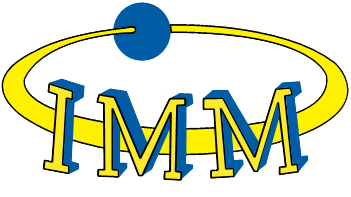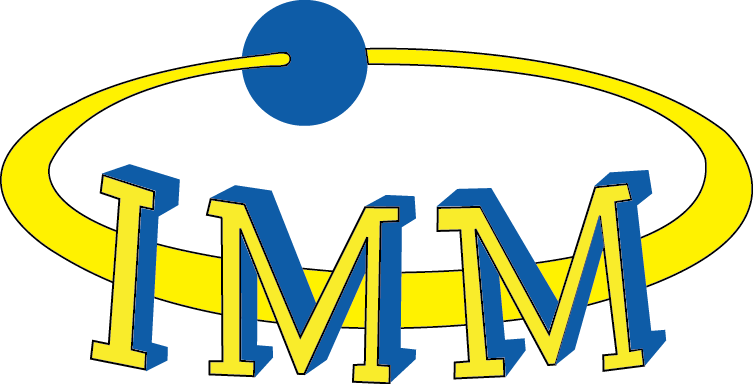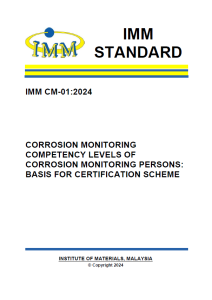| Standard | Title and Scope | Published Date | Access Link |
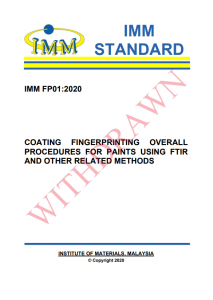 |
IMM FP01:2020 This Standard emphasizes the evaluation of the manufacturer’s paint fingerprint, with the aim of reaffirming the consistency of the paint supplied with reference to the qualified paint. This Standard covers the fingerprint requirement of both single-pack and multi-pack paints for qualification, quality control and verification. This Standard includes: NOTE. The requirement of coating fingerprinting is stated in various specifications and standards, namely ISO 12944-9:2018, ASTM D7588-11(2018) and ASTM D2621-87. However, all of these standards are lacking with respect to the interpretation of FTIR spectra or the estimation of the degree of similarity between two FTIR spectra. Hence, there is a need to establish a working standard for the execution of coating fingerprinting. |
Withdrawn |
Click here to view the withdrawn standard
Replaced with MS2736:2022 https://mysol.jsm.gov.my/search-catalogue?keyword=fingerprinting |
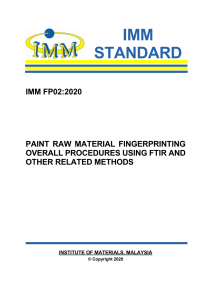 |
IMM FP02:2020 PAINT RAW MATERIAL FINGERPRINTING OVERALL PROCEDURES USING FTIR AND OTHER RELATED METHODSThis Standard emphasizes the evaluation of paint raw material fingerprint, with the aim of reaffirming the consistency of the raw materials supplied with reference to the qualified raw materials for paint products. This Standard covers the fingerprint requirement of all paint raw materials (for example: solvent, pigment, binder, additive, etc) for qualification, quality control and verification, except inorganic materials (for example: zinc metal and titanium dioxide). For inorganic components, the mill certificate or the certificate of analysis (COA) shall be supplemented.This Standard includes: i. Fingerprinting qualification for paint raw materialsii. Test method to fingerprint the raw materials received in the container iii. Criteria and execution of Raw Material Fingerprint Certificate NOTE. The requirement of coating fingerprinting is stated in various specifications and standards, namely ISO 12944-9:2018, Paints and varnishes- Corrosion protection of steel structures by protective paint systems– Part 9: Protective paint systems and laboratory performance test methods for offshore and related structures, ASTM D7588-11(2018) Standard guide for FTIR fingerprinting of a non-aqueous liquid paint as supplied in the manufacturer’s container, and ASTM D2621-87 Standard test method for infrared identification of vehicle solids from solvent-reducible paints. However, all of these standards are limited to inspection and test methods of the paint system. IMM FP01:2019 Coating fingerprinting overall procedures for paints using FTIR and other related methods were developed with respect to the interpretation of FTIR spectra or the estimation of the degree of similarity between two FTIR spectra. The application of interpretation of FTIR with an estimation of the degree of similarity between two FTIR spectra is extended to paint raw materials in IMM FP02:2020 and dried coatings in IMM FP03:2020. |
13 June 2020 | Click here to view and download |
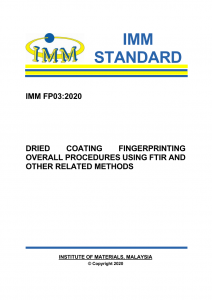 |
IMM FP03:2020 This Standard emphasizes the evaluation of dried coating fingerprint, with the aim of reaffirming the consistency of the dried coating applied with reference to the qualified dried coating. This Standard covers the fingerprint requirement of different coating systems for the qualification, quality control and verification. This Standard includes: NOTE. The requirement of coating fingerprinting is stated in various specifications and standards, namely ISO 12944-9:2018, ASTM D7588-11(2018) and ASTM D2621-87. However, all of these standards are lacking with respect to the interpretation of FTIR spectra or the estimation of the degree of similarity between two FTIR spectra. Hence, there is a need to establish a working standard for the execution of coating fingerprinting. IMM FP01:2019 was developed with respect to the interpretation of FTIR spectra or the estimation of the degree of similarity between two FTIR spectra. The application of interpretation of FTIR with an estimation of the degree of similarity between two FTIR spectra is extended to paint raw materials in IMM FP02:2020 and dried coatings in IMM FP03:2020. |
13 June 2020 | Click here to view and download |
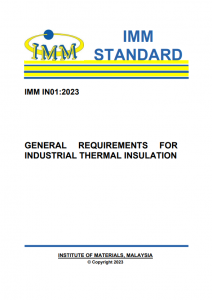 |
IMM IN01:2023 This Standard emphasizes the general requirements for industrial thermal insulation systems, which are applicable to Malaysia’s climate condition and environment. This Standard covers the general thermal insulation requirements for industrial applications for the temperature range This Standard includes: NOTE. The requirement of thermal insulation is stated in various specifications and standards, namely PTS 39.46.00.31, CINI 1.3.01 & 1.3.02a, ASTM C1696-20 and JIP 33 S-738 (to mention a few). However, not all the thermal insulation requirements in these standards are applicable to Malaysia’s climate condition and some standards are limited to specific industrial purposes. IMM IN01:2022 General Requirements for Industrial Thermal Insulation was developed with respect to general practices which is applicable in Malaysia’s thermal insulation industries. Hence there is a need to establish a reference standard for thermal insulation, with an extension of the general industrial practices of thermal insulation that is suitable for Malaysia’s context. |
12 January 2024 | Click here to view and download |
|
|
IMM CM-01:2024 This Standard defines three levels of competence (details in Clause 4) for persons working in the field of corrosion monitoring (CM) including monitoring of internal and external corrosion of pipes and equipment using destructive and non-destructive testing and survey methods such as corrosion coupons, ultrasonic probes, electric resistance probes, linear polarization probes, electrochemical techniques, and other basic and advance techniques to monitor the effectiveness of corrosion inhibition systems and cathodic protection systems. For the other basic and advanced techniques, competence of awareness level on eddy current techniques, electromagnetic techniques, chemical techniques, acoustic sound techniques, magnetic memory, coating application and breakdown survey. It specifies a framework for establishing these competence levels and their minimum requirements. Competence levels apply to all application sectors in all industries. This document specifies the requirements to be used for establishing a certification scheme as defined in ISO/IEC 17024. This certification scheme is detailed in Annexes A, B and C. |
4 November 2024 | Click here to view and download |
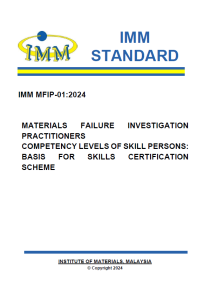 |
IMM MFIP-01:2024 This document specifies skill framework for establishing critical knowledge, skills and performance levels that a practitioner working in the field of Materials Failure Investigation (MFI) shall have in order to carry out the investigation on failure of Materials (1.3.13). This Standard defines practitioners’ competence levels and their minimum requirements. The levels of competence (details in Clause 4) include but not limited to physical and chemical analyses, spectroscopic analysis, operating testing equipment, handling of chemicals and materials, data collection & analysis, results analysis, troubleshooting, and report writing. A list of equipment and methodology used in the investigation of materials is given in Annex E. The above descriptions of testing and analytical activities are not exhaustive and shall include new developments and new technologies over time. Competence levels and their minimum requirements shall be defined according to best practices and requirements in specific application sector such as oil & gas, marine, utility, electronics, etc. This document specifies the requirements to be used for establishing a certification scheme as defined in ISO/IEC 17024. This certification scheme is detailed in Annexes A, B and C. |
8 November 2024 | Click here to view and download |
